LeadFuze Alternatives
A direct comparison of 10 LeadFuze alternatives. We cover strengths, weaknesses, and ideal use cases to help you choose the right tool.

LeadFuze is a popular tool for good reasons. Many sales and marketing teams use it to automate prospecting and build targeted lead lists. It performs well with its user-friendly interface and saves teams significant time on manual research, which is a big plus for many.
However, like any tool, it has limitations. Some users report that it can be slow with complex filters and that contact data can be limited, especially outside the US. For this reason, we've identified and analyzed the best alternatives to help you shortlist your options. Let's get started.
Try 11x for Your Sales Team
If your sales strategy includes digital workers, consider 11x. The platform provides autonomous agents for various sales tasks. This can be a practical option for teams that want to add automated sales functions to their current process.
We offer 11x as a unified GTM platform where AI agents manage the sales process. Our agent Alice finds prospects, conducts outreach, and updates your CRM. A second agent, Julian, qualifies inbound leads and schedules meetings. This approach removes the need for separate data, outreach, or warmup tools.
LeadFuze Alternatives
Here, we analyze the main alternatives to LeadFuze. Each review covers pricing, features, and a comparison of advantages and drawbacks relative to LeadFuze.
1) ZoomInfo SalesOS
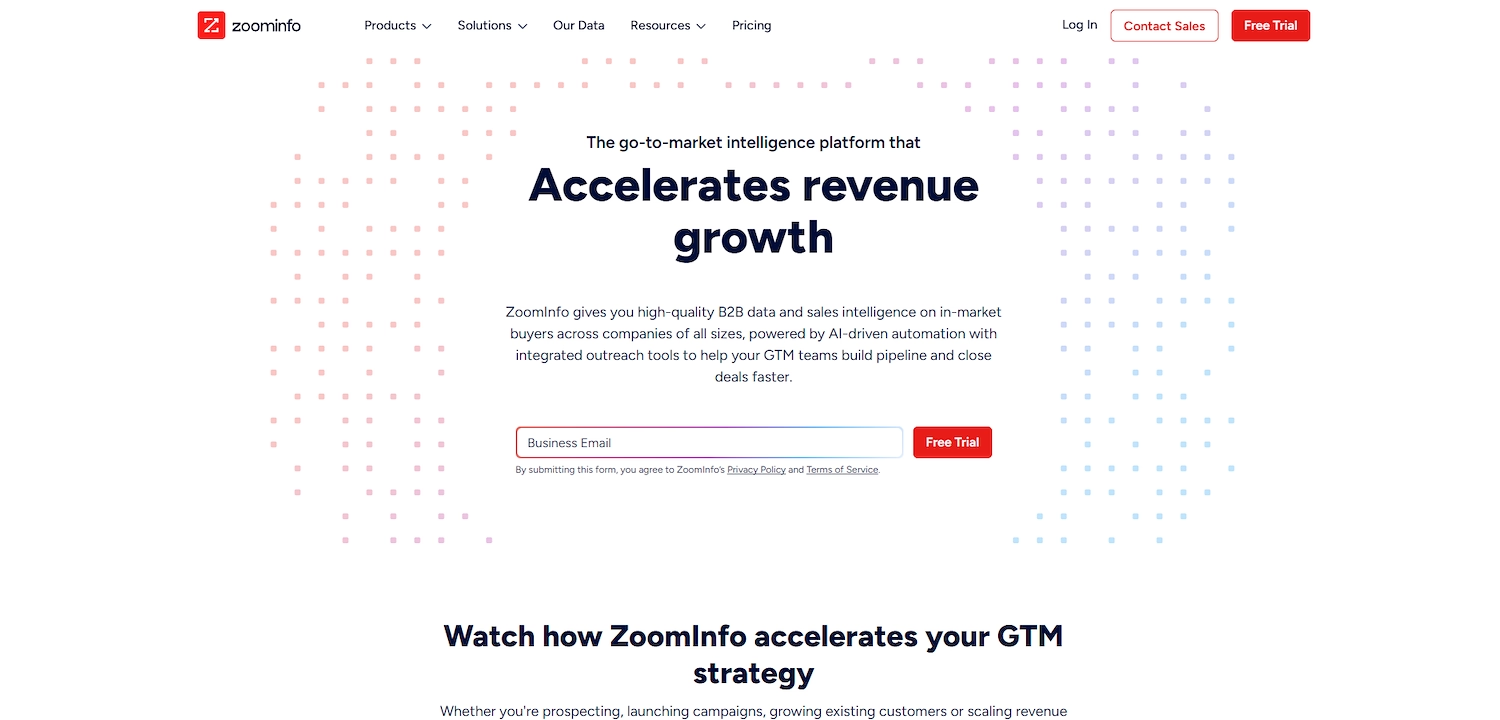
ZoomInfo SalesOS is an AI-powered go-to-market platform for B2B organizations. It combines contact data, buyer-intent signals, and engagement tools. Teams use it to build prospect lists, generate pipeline, and find account growth opportunities. The platform offers a unified data source for sales, marketing, and RevOps teams.
ZoomInfo SalesOS's Main Features
- Provides real-time buyer intent signals to identify prospects who are ready to purchase.
- Analyzes call and meeting interactions with conversation intelligence to gather insights.
- Includes a generative-AI companion, Copilot, that surfaces insights and drafts outreach.
- Turns anonymous website page views into potential sales pipeline through visitor tracking.
ZoomInfo SalesOS vs. LeadFuze: A Comparison
Average Review score: 4.5/5 stars based on 8,738 G2 reviews.
- ZoomInfo SalesOS provides buyer intent data to identify prospects who are ready to purchase. This is a more proactive approach compared to the static list-creation filters in LeadFuze.
- The platform includes an AI companion, Copilot, that gives guided recommendations on who to contact and when. LeadFuze does not have a comparable AI assistant for sales outreach.
- It offers conversation intelligence to analyze sales calls and meetings for insights. This provides a level of post-interaction analysis that LeadFuze lacks.
- The tool identifies anonymous website visitors and turns them into potential leads. This is a direct pipeline generation feature, whereas LeadFuze focuses on list creation from external data.
Where ZoomInfo SalesOS Falls Short
- The platform's pricing is in the enterprise range, which can be a consideration for smaller businesses. Compared to LeadFuze, the implementation time is also longer, with an average of one month to get started.
- Some users find the extensive features can create a steeper learning curve. In contrast, LeadFuze is often noted for its user-friendly interface that allows teams to start building lists more quickly.
- For teams that only need automated list-building, the tool might feel overly complex. LeadFuze provides a more focused solution for creating targeted lead lists without the extra features of a full go-to-market platform.
- Users sometimes report that contact or company data can be outdated. This can be a point of friction, similar to how LeadFuze's data can be limited for international contacts.
Pricing and Budget Considerations
ZoomInfo SalesOS operates on an enterprise-level pricing model, which is a higher investment than LeadFuze's plans. While LeadFuze's pricing is also considered high, it is generally more accessible for teams that need a focused list-building tool rather than a full go-to-market platform.
2) Apollo.io
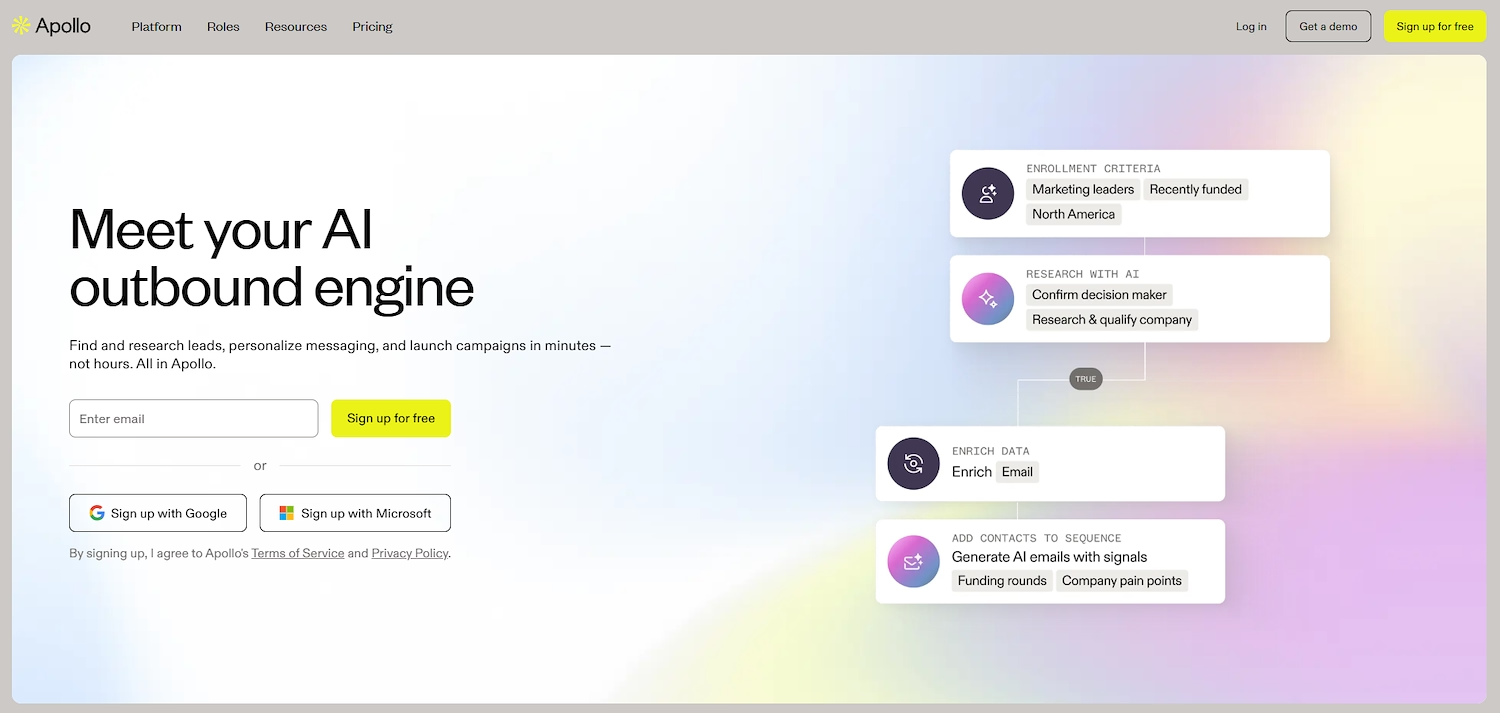
Apollo.io is a sales intelligence platform with a B2B database and an engagement suite. Teams use it to find contacts, execute outreach, and manage sales workflows. The system combines data and automation tools to help sales professionals connect with potential customers from a single interface.
Apollo.io's Main Features
- Provides a B2B database to find contacts and build prospect lists.
- Includes an engagement suite to execute outreach campaigns across multiple channels.
- Automates sales workflows, including task management and follow-up sequences.
- Combines data, outreach, and workflow tools into a single platform.
Apollo.io vs. LeadFuze: A Comparison
Average Review score: 4.7/5 stars based on 8,904 G2 reviews.
- Apollo.io combines a contact database with an engagement suite in one platform. This contrasts with LeadFuze, which primarily generates lists that users must export for outreach.
- It offers a free plan, which makes it accessible for individuals or small teams to start. LeadFuze does not have a comparable free option and operates on paid subscription tiers.
- The platform provides a database of over 210 million contacts, offering extensive data access. This is a larger scale compared to LeadFuze, where users sometimes note data limitations, particularly for international contacts.
- This tool includes an intelligence engine that gives recommendations and analytics. This feature provides guidance on sales activities, a function not present in LeadFuze's list-generation focus.
Where Apollo.io Falls Short Compared to LeadFuze
- Some users report that Apollo.io's all-in-one platform has a steeper learning curve. LeadFuze, in comparison, offers a more focused interface for teams that only need to create lead lists.
- The tool's large database sometimes contains inaccurate information. This may require more verification from sales teams, unlike the more focused list creation process in LeadFuze.
- Its all-in-one design might not fit well with teams that already use a set of sales tools. LeadFuze, by contrast, specializes in list creation, which can be a simpler addition to an existing workflow.
Pricing and Budget Considerations
Apollo.io offers a flexible entry point with a free plan and paid tiers starting at $49 per user monthly. In contrast, LeadFuze has no free option and its contract-based pricing is generally higher, making Apollo.io more accessible for teams with smaller budgets. For detailed pricing, we recommend visiting Apollo.io's official website.
3) Lusha
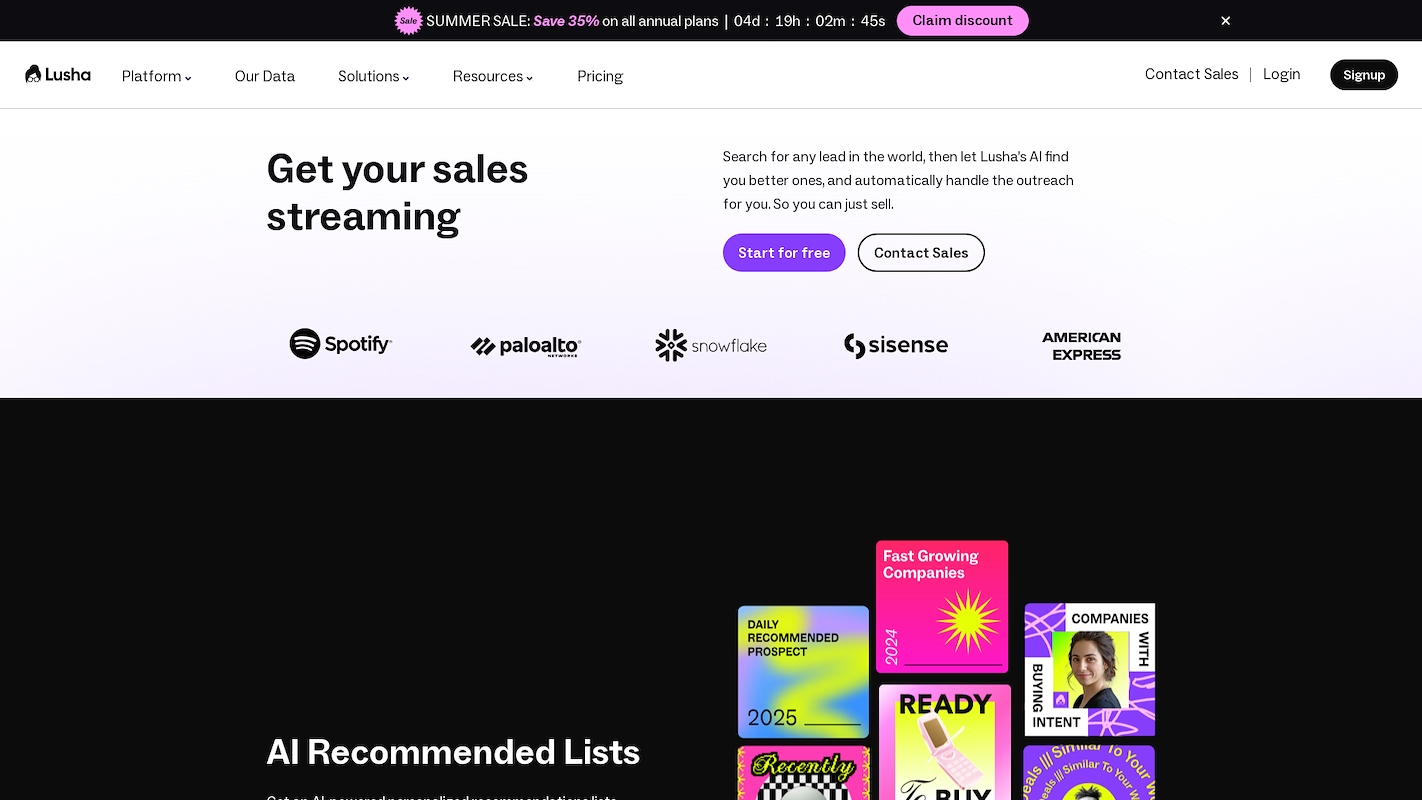
Lusha is a sales intelligence platform for revenue teams to find B2B leads worldwide. The system uses AI to recommend similar prospects and automates multichannel outreach within a single workflow. It emphasizes global data coverage and compliance with standards like GDPR and CCPA.
Teams use it to build accurate prospect lists and enrich CRM records with current data, which can remove the need for manual research.
Lusha's Main Features
- Identifies in-market buyers and sends real-time notifications based on intent triggers.
- Delivers daily, ICP-based lists of prospects and provides auto-updating playlists that add new leads at set intervals.
- Automates and personalizes email sequences using AI-generated copy to engage with prospects.
- Records and analyzes sales meetings to provide insights through its conversation intelligence feature.
Lusha vs. LeadFuze: A Comparison
Average Review score: 4.3/5 stars based on 1,516 G2 reviews.
- Lusha provides AI Prospect Playlists that automatically refresh with new leads, which is different from LeadFuze, where users build static lists based on manual filter selections.
- The platform sends real-time notifications for in-market buyers based on intent data, while LeadFuze generates lists from its database without this layer of real-time intent signals.
- It includes a feature to automate and personalize email outreach sequences. LeadFuze, in contrast, focuses on list creation and requires users to export contacts for outreach.
- This tool offers a free plan for individuals to test the platform, providing an accessible entry point that is not available with LeadFuze's subscription-only model.
Where Lusha Falls Short Compared to LeadFuze
- Lusha's credit system can restrict access to contact details, especially phone numbers. This is different from LeadFuze, which provides a set number of leads per month without a separate credit system for individual data points.
- Some users report gaps in its CRM integration, particularly with two-way sync. This can require more manual data work compared to LeadFuze's more direct process of list creation and export.
- The platform's broad feature set might feel less focused for teams that only need list generation. In contrast, LeadFuze offers a more specialized tool for building targeted lead lists, which some teams find simpler to adopt.
Pricing and Budget Considerations
Lusha provides a flexible pricing model with a free plan and paid tiers starting at $36 per user per month. This contrasts with LeadFuze's contract-based approach, which lacks a free option, making Lusha more accessible for smaller teams. For detailed pricing, we recommend visiting Lusha's official website.
4) Seamless.ai
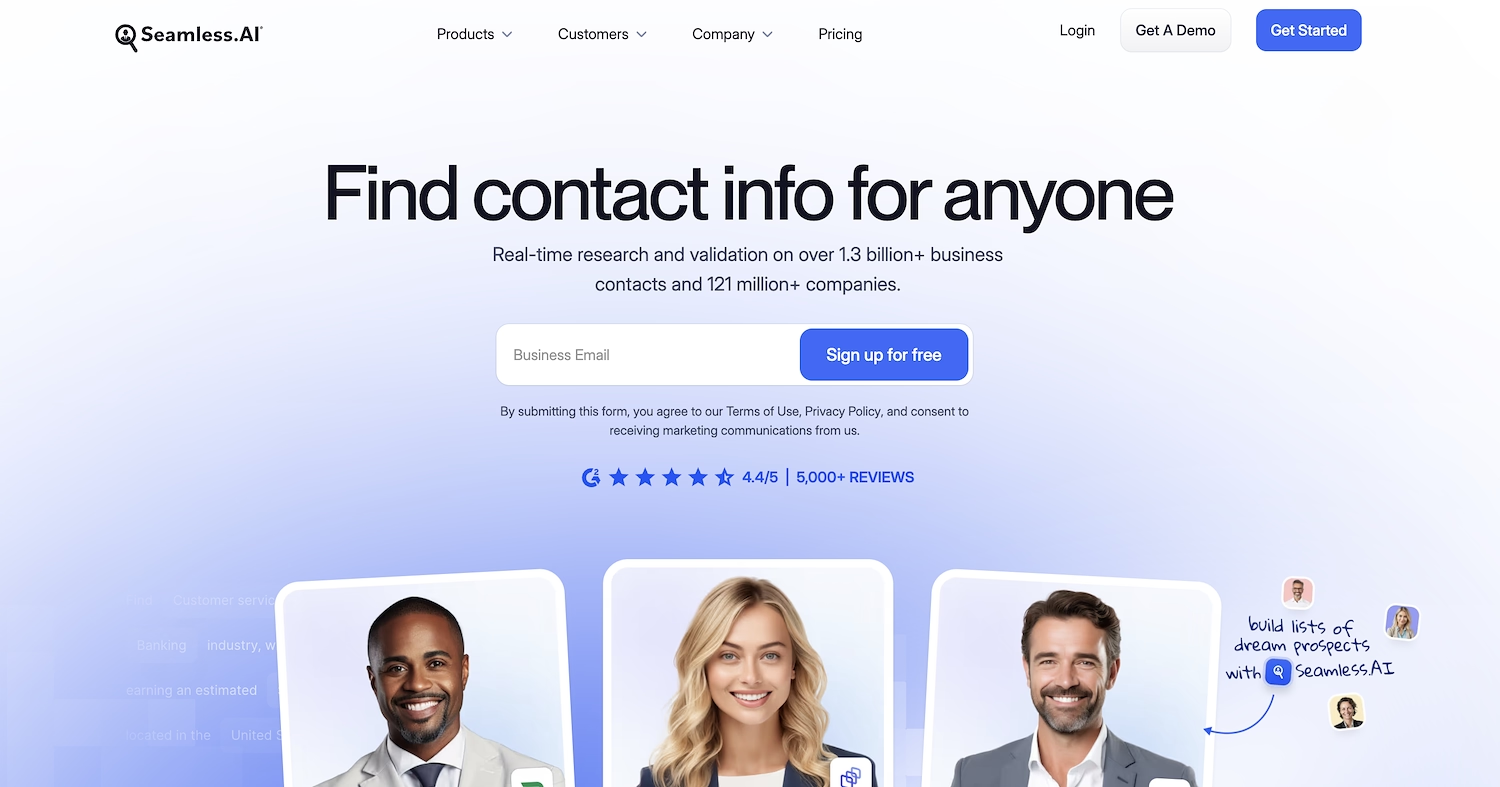
Seamless.ai is a real-time search engine for B2B data. It provides a database of contacts with verified phone numbers and emails. Sales teams use the platform to build prospect lists and identify decision-makers within specific accounts.
The tool is used for direct outreach and to support lead generation efforts.
Seamless.ai's Main Features
- Searches a database of over 1.3 billion contacts and 121 million companies to find prospect profiles.
- Provides buyer intent data to identify prospects who are actively looking to make a purchase.
- Detects and sends alerts when prospects or customers change jobs, and captures their new contact information.
- Uses AI to generate research and personalized messages for outreach to each prospect.
Seamless.ai vs. LeadFuze: A Comparison
Average Review score: 4.4/5 stars based on 5,067 G2 reviews.
- Seamless.ai provides buyer intent data to identify prospects who are actively looking to buy. This is different from LeadFuze, which creates lists based on filters without these real-time signals.
- The platform sends alerts when contacts change jobs and finds their new information. This feature helps maintain data accuracy over time, a function not available in LeadFuze.
- It uses AI to generate research and personalized messages for outreach. In comparison, LeadFuze focuses on list generation and requires users to export contacts to another tool for outreach.
- The tool functions as a real-time search engine for B2B data. This approach provides live results, while LeadFuze builds lists from its existing, static database.
Where Seamless.ai Falls Short Compared to LeadFuze
- Some users find the platform's broad feature set creates a learning curve. In contrast, LeadFuze offers a more focused interface for list generation, which can be simpler for teams that need to start quickly.
- The tool operates on a credit system that can feel restrictive for heavy use. This is different from LeadFuze, which typically provides a set number of leads per month without a separate credit limit.
- Its real-time search can sometimes return outdated contact information, which may require extra verification. LeadFuze provides a more direct list-building process from its curated database, which some teams might find more straightforward.
Pricing and Budget Considerations
Seamless.ai offers a free plan with credits, which provides more flexibility than LeadFuze's contract-based model. While both tools are in a similar price range, Seamless.ai's approach may be more suitable for teams that want to test the platform first. For detailed pricing, we recommend visiting Seamless.ai's official website.
5) Cognism
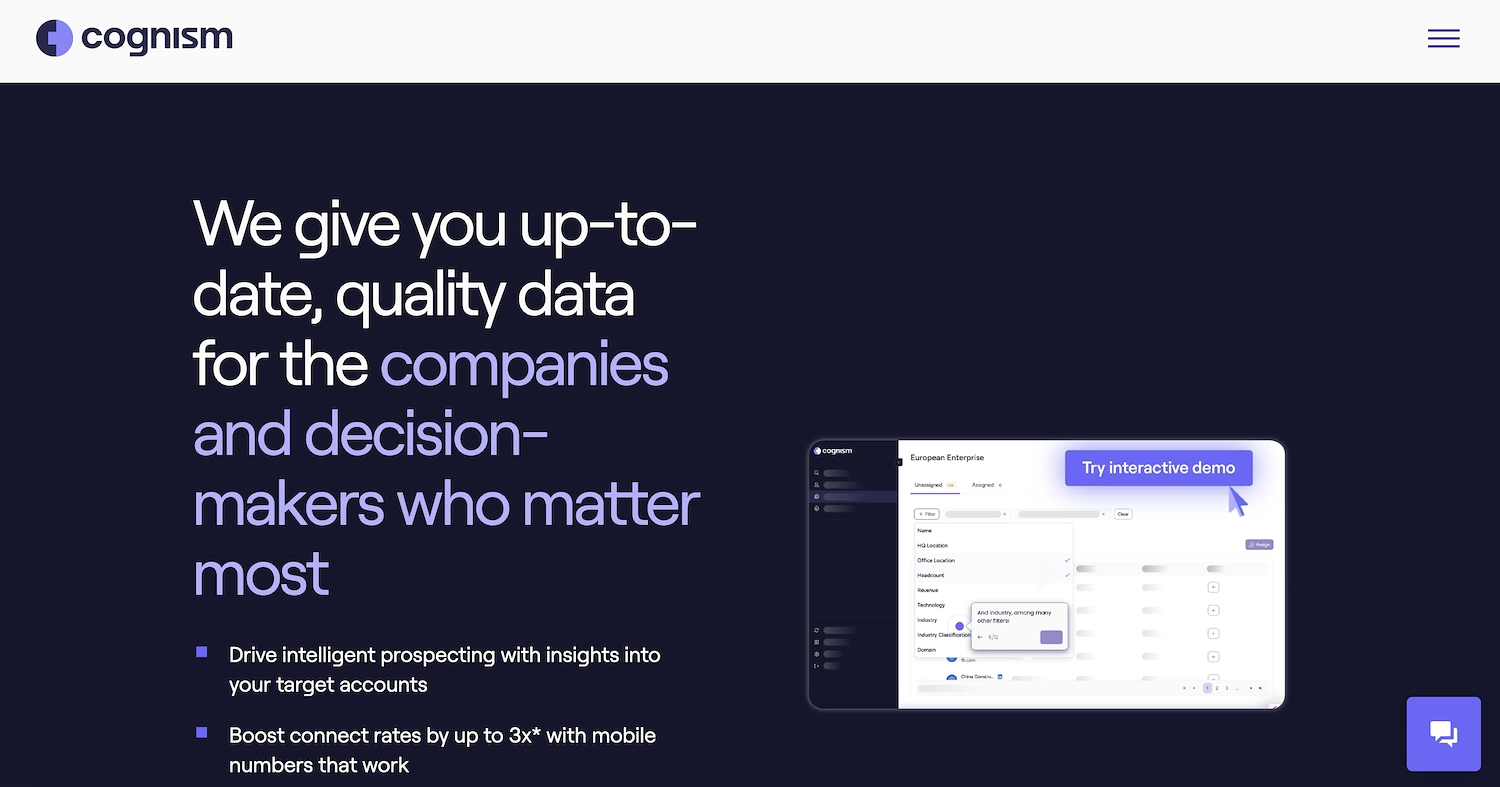
Cognism is a sales intelligence platform for B2B teams. It offers a database of contacts and companies to help users find prospects and support outreach campaigns.
The platform focuses on data quality and compliance. This makes it an option for teams that require accurate information for sales and marketing.
Cognism's Main Features
- Provides phone-verified and human-checked mobile numbers, called Diamond Data®, to improve connect rates.
- Offers extensive data coverage with a focus on contacts in the UK and EMEA regions.
- Surfaces buying signals from data points like hiring trends, funding rounds, and technology changes.
- Enriches existing CRM records in bulk through CSV or API to complete and refresh contact information.
Cognism vs. LeadFuze: A Comparison
Average Review score: 4.6/5 stars based on 1,033 G2 reviews.
- Cognism provides phone-verified mobile numbers, called Diamond Data®, to improve connection rates. This is a different approach from LeadFuze, which focuses on list generation without this specific human-verification step.
- The platform offers strong data coverage for contacts in the UK and EMEA regions. This can be an advantage compared to LeadFuze, where data is sometimes limited for contacts outside the US.
- It identifies buying signals from data points like company funding and technology changes. This provides a more dynamic way to find prospects compared to LeadFuze's filter-based list building.
- The tool enriches existing CRM records in bulk to keep contact information current. LeadFuze, in contrast, is primarily used to build new lists that are then exported to a CRM.
Where Cognism Falls Short Compared to LeadFuze
- Cognism's setup takes about a month, which can delay prospecting. In comparison, LeadFuze's focused list-building function often allows teams to get started much faster.
- The platform's broad feature set can introduce a learning curve for new users. LeadFuze provides a more specialized tool for list generation, which some teams find simpler to integrate into their workflow.
- Some users report occasional sync issues with CRMs, which may require manual data verification. This differs from LeadFuze's more direct process, where users typically create and then export static lists.
Pricing and Budget Considerations
Both Cognism and LeadFuze are considered enterprise-level investments, with pricing on the higher end. LeadFuze typically requires a contract, while Cognism's pricing can be a significant factor for smaller teams. For the most accurate and up-to-date pricing information, we recommend visiting Cognism's official website.
Consider 11x for Sales Automation
If your team is interested in digital workers for sales, 11x offers autonomous agents to find prospects and qualify leads. This approach can supplement your existing sales process with automated functions.
Our platform provides a unified system where AI agents manage sales tasks. To see how this works for your team, you can schedule a demo to learn more about our digital workers, Alice and Julian.
At 11x, we use AI to manage your sales process from start to finish. Our agent Alice identifies accounts and runs outreach, while Julian qualifies inbound leads and books meetings. Our platform consolidates your GTM stack, replacing separate tools for intent data, enrichment, and email warmup.
To see 11x in action, book a demo.
6) RocketReach
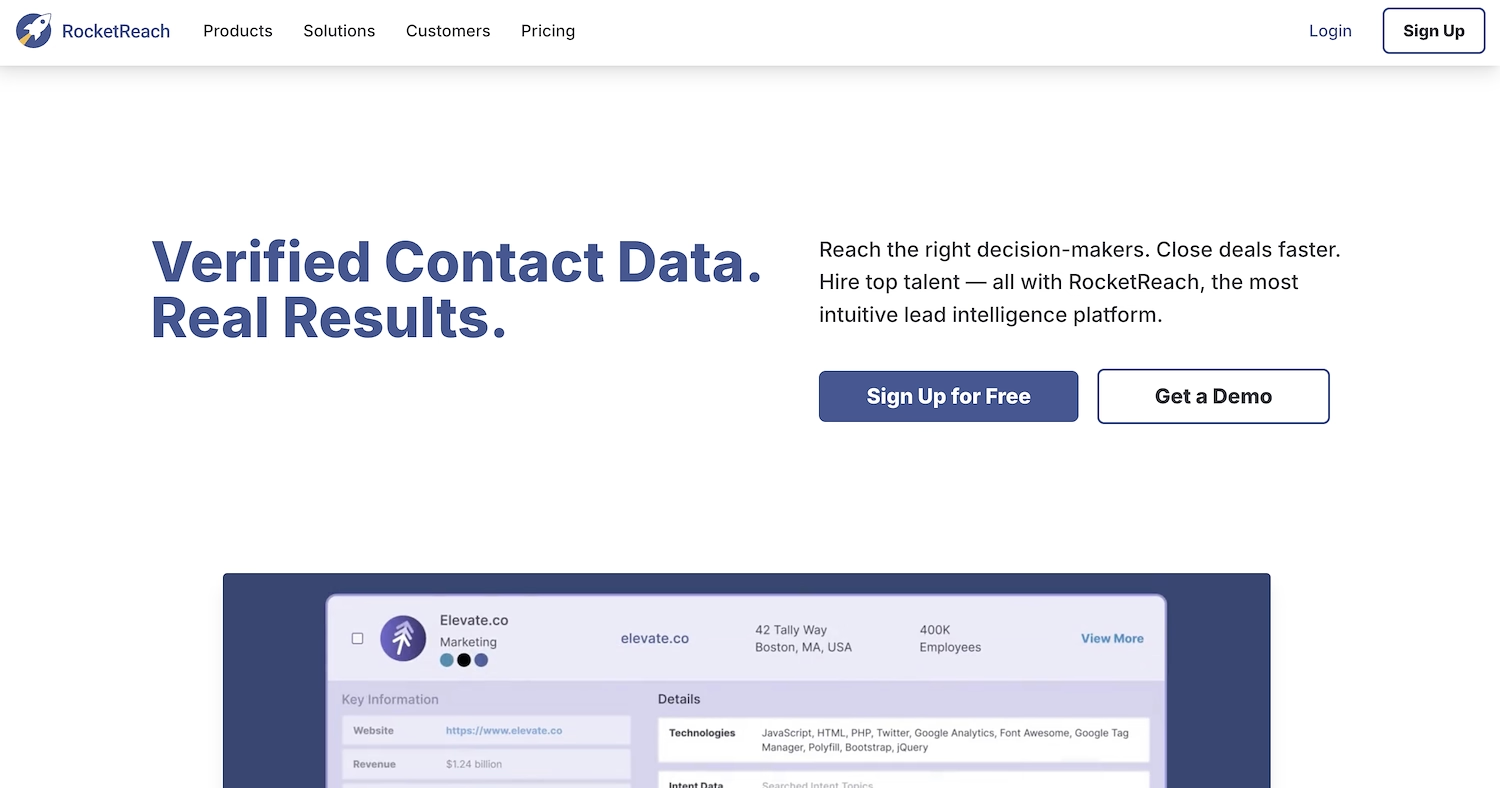
RocketReach is a B2B database of professional and company profiles. It provides contact information that sales, marketing, and recruitment teams use to find and connect with decision-makers.
The platform allows users to build prospect lists and gather data to support outreach campaigns. It serves as a data source for lead generation and business development.
RocketReach's Main Features
- Offers a searchable database of professional and company profiles for prospecting.
- Provides contact information for decision-makers to support sales, marketing, and recruitment.
- Allows users to build custom prospect lists and gather data for outreach campaigns.
- Serves as a data source for lead generation and business development activities.
RocketReach vs. LeadFuze: A Comparison
Average Review score: 4.4/5 stars based on 918 G2 reviews.
- RocketReach provides access to a database of over 700 million professionals. This offers a broader data pool compared to LeadFuze, which sometimes has data limitations for international contacts.
- The tool offers a free plan for users to test its database with a few lookups. This provides an entry point not available with LeadFuze's subscription-only model.
- It includes automated workflows to engage with prospects directly on the platform. In contrast, LeadFuze requires users to export lists to a separate tool for outreach.
- The platform has a powerful API and direct integrations with tools like Salesforce and HubSpot. This allows for a more connected workflow than LeadFuze, which centers on exporting lists.
Where RocketReach Falls Short Compared to LeadFuze
- Some users report that RocketReach's data can sometimes be inaccurate. This may require more manual verification compared to LeadFuze, which builds lists from a more curated database.
- The platform's credit system is based on individual lookups. This can feel restrictive for high-volume prospecting, unlike LeadFuze, which typically provides a set number of leads per month.
- Its interface includes a wide range of features beyond simple list building. For teams that only need to generate lists, this might introduce a learning curve compared to LeadFuze's more focused and straightforward design.
Pricing and Budget Considerations
RocketReach provides a free plan and paid tiers starting at $99 per month for 100 lookups, offering a flexible entry point. In contrast, LeadFuze uses a contract-based model that is generally considered a higher investment. For detailed pricing, we recommend visiting RocketReach's official website.
7) Hunter
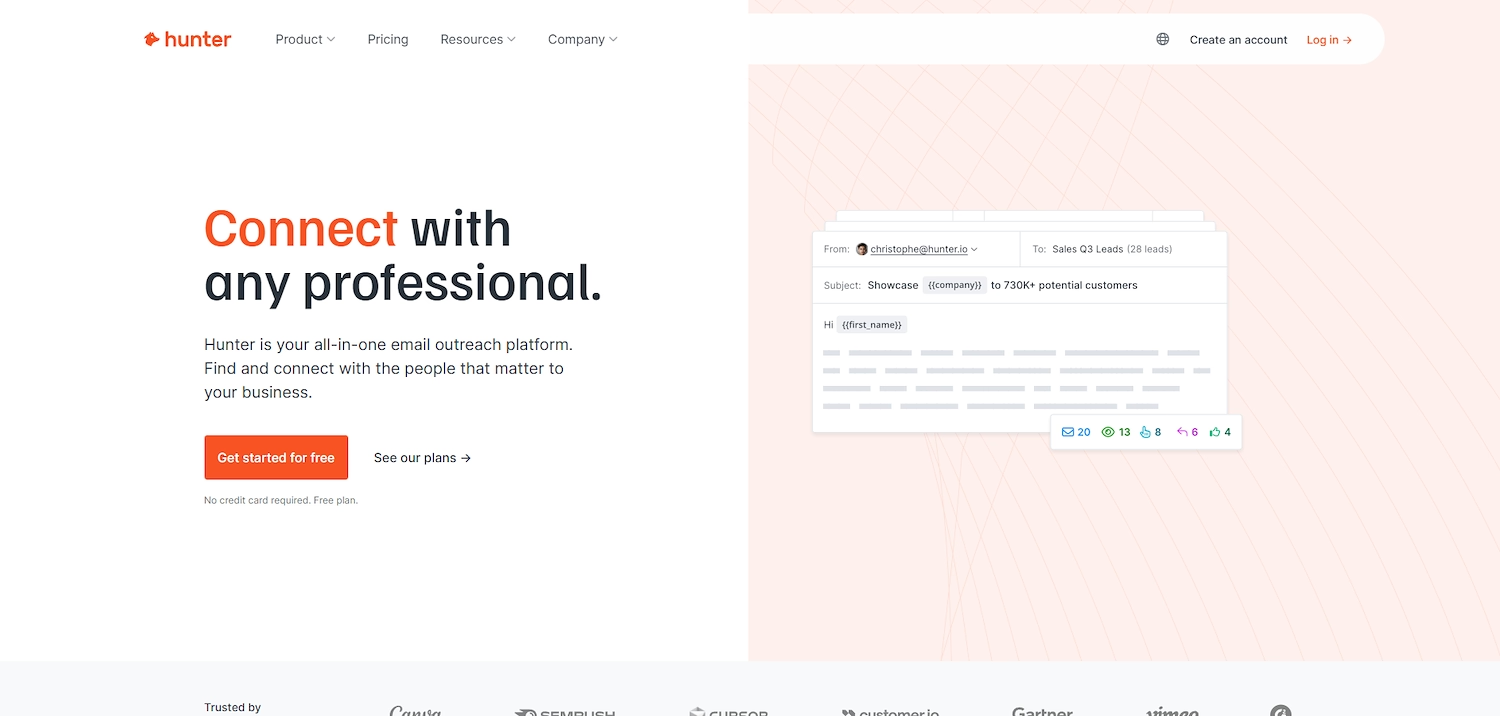
Hunter is an email finder platform that helps sales and marketing teams connect with professionals. Users can find email addresses for contacts at any company, which supports list-building for outreach campaigns. The tool acts as a data source for lead generation and business development.
Hunter's Main Features
- Finds all publicly available email addresses from a specific domain name or URL through its Domain Search feature.
- Includes an email verifier that validates lists to reduce bounce rates and protect sender reputation.
- Provides a cold-email suite to compose messages, schedule follow-ups, and view performance analytics.
- Lists websites based on the technology stack they use through its TechLookup feature for targeted prospecting.
Hunter vs. LeadFuze: A Comparison
Average Review score: 4.4/5 stars based on 592 G2 reviews.
- Hunter includes a cold-email suite to manage outreach campaigns directly on the platform. This is different from LeadFuze, which requires users to export their generated lists to a separate tool for sending emails.
- The platform provides an email verifier to check the validity of addresses before outreach. This helps reduce bounce rates, a feature not central to LeadFuze's list-building process.
- It offers a free plan for users to test the service with a limited number of searches. In contrast, LeadFuze operates on a subscription-only model without a free entry point.
- Hunter's TechLookup feature allows users to find prospects based on the technology their websites use. This provides a different targeting method compared to LeadFuze's filters, which focus on company and contact attributes.
Where Hunter Falls Short Compared to LeadFuze
- Hunter offers fewer advanced filtering options for list building. LeadFuze allows users to create highly targeted lists with multiple criteria. This difference means Hunter may not suit teams that need to build prospect lists based on very specific and complex ideal customer profiles.
- The tool's data is primarily focused on email addresses. In comparison, LeadFuze often provides more comprehensive contact profiles. For teams that rely on multi-channel outreach, such as phone calls, this focus on email alone can be a limitation.
- Its list-building process is less automated compared to LeadFuze. LeadFuze automatically finds new leads that fit a user's search criteria. Hunter's process, which often involves searching domain by domain, can require more manual work to build a list from scratch.
Pricing and Budget Considerations
Hunter offers a free plan and paid tiers starting at $49 per month, providing a more accessible entry point than LeadFuze's contract-based model. This makes Hunter a more budget-friendly choice for teams that need to test a service before committing to a contract.
8) UpLead
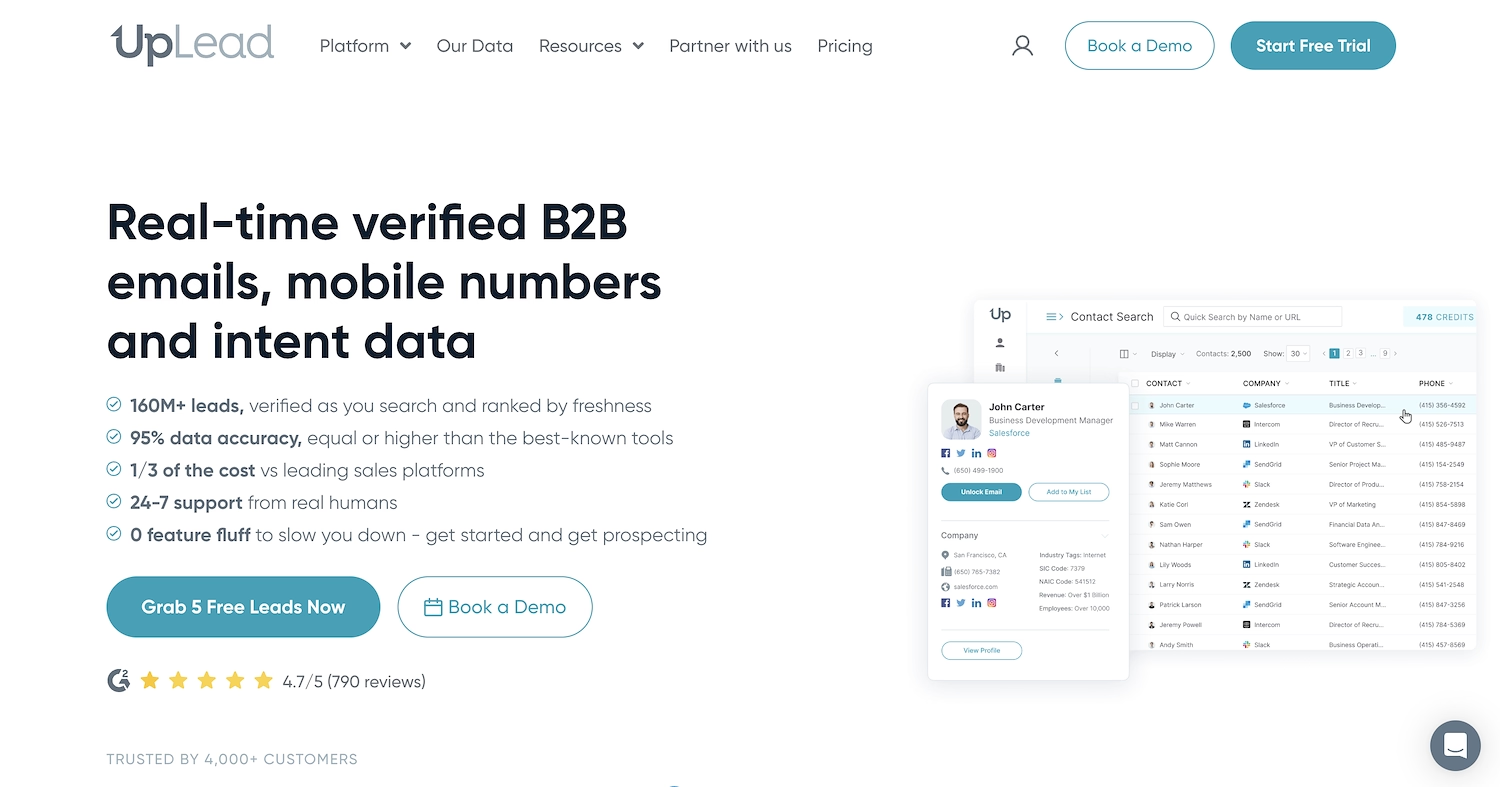
UpLead is a B2B prospecting tool that provides access to a database of contacts and companies. It offers verified B2B contact and company data to help sales teams build lists of potential customers. The platform is a resource for lead generation and account-based marketing strategies.
UpLead's Main Features
- Provides real-time email verification and uses over 50 search filters to find contacts.
- Uses intent data to identify in-market buyers who are ready to purchase.
- Cleans and enriches existing CRM records with current contact and company data.
- Integrates with Salesforce, HubSpot, and other CRMs through direct connections or Zapier.
UpLead vs. LeadFuze: A Comparison
Average Review score: 4.7/5 stars based on 797 G2 reviews.
- UpLead provides real-time email verification, which helps ensure data accuracy before outreach. This is different from LeadFuze, where lists are built from its database without a similar live validation step.
- It uses intent data to identify prospects who are actively looking to buy. This offers a more dynamic approach compared to LeadFuze's method of building lists from static filters.
- The platform can clean and enrich existing data directly within a CRM. In contrast, LeadFuze focuses on creating new lists that users then export to their systems.
- UpLead offers a free trial for users to test the platform with a set number of credits. This provides an accessible entry point that is not available with LeadFuze's subscription-only model.
Where UpLead Falls Short Compared to LeadFuze
- UpLead requires manual searches to build lists with its filters. This differs from LeadFuze, which has an automated feature that continuously finds new prospects for a user's saved search.
- The tool uses a credit system for contact lookups. This model can be restrictive for high-volume prospecting compared to LeadFuze, which typically offers a set number of leads each month.
- Some users report delays in the real-time verification process. This can result in outdated information, which requires extra checks compared to building lists from LeadFuze's curated database.
Pricing and Budget Considerations
UpLead provides a free trial and paid plans starting at $99 per month, offering more flexibility than LeadFuze's contract-based model. This makes UpLead a more accessible choice for teams that want to avoid a long-term commitment. For detailed pricing, we recommend visiting UpLead's official website.
9) Snov.io
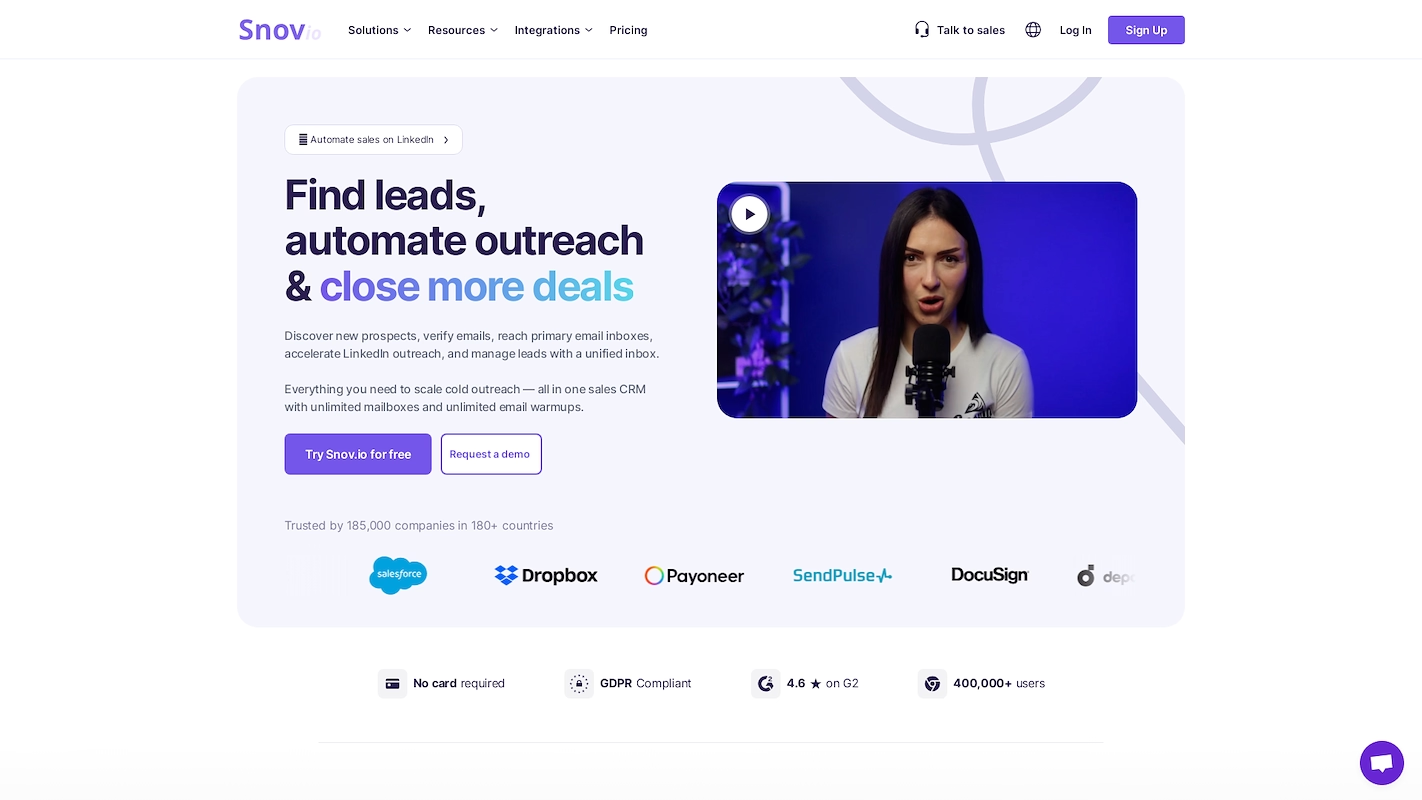
Snov.io is a sales automation platform for lead generation and outreach. Teams use it to find email addresses, verify contacts, and run email drip campaigns.
The system helps users build prospect lists and engage potential customers through automated sequences, all from a single platform.
Snov.io's Main Features
- Manages sales opportunities and the overall pipeline.
- Automates sales force activities and tasks.
- Provides lead management and marketing automation functions.
- Offers reporting and analytics with dashboards.
Snov.io vs. LeadFuze: A Comparison
Average Review score: 4.6/5 stars based on 450 G2 reviews.
- Snov.io includes sales and marketing automation to run email campaigns directly on the platform, which is different from LeadFuze, where users export lists for outreach.
- It provides opportunity and pipeline management to track deals from start to finish, a feature not found in LeadFuze's list-creation focus.
- The tool combines lead generation with contact management and reporting dashboards, offering a more all-in-one system compared to LeadFuze's specialized list-building function.
- Snov.io offers a free trial plan for users to test the platform, while LeadFuze operates on a subscription-only model without a similar free option.
Where Snov.io Falls Short Compared to LeadFuze
- Snov.io's lead generation can require more manual effort. Unlike LeadFuze, which automatically finds new prospects for a saved search, Snov.io users often build lists through individual searches.
- The platform's filtering options are less advanced than what LeadFuze offers. This may make it difficult to build highly specific prospect lists, as LeadFuze allows for more complex search criteria.
- Some users report that the contact data can be less comprehensive. Compared to LeadFuze's focus on building complete prospect profiles, Snov.io sometimes provides less detailed information beyond an email address.
Pricing and Budget Considerations
Snov.io offers a free trial and paid plans starting at $39 per month, providing a more accessible entry point than LeadFuze's contract-based model. This makes Snov.io a practical option for teams that want to test a platform before committing to a higher-cost subscription.
10) Clearbit
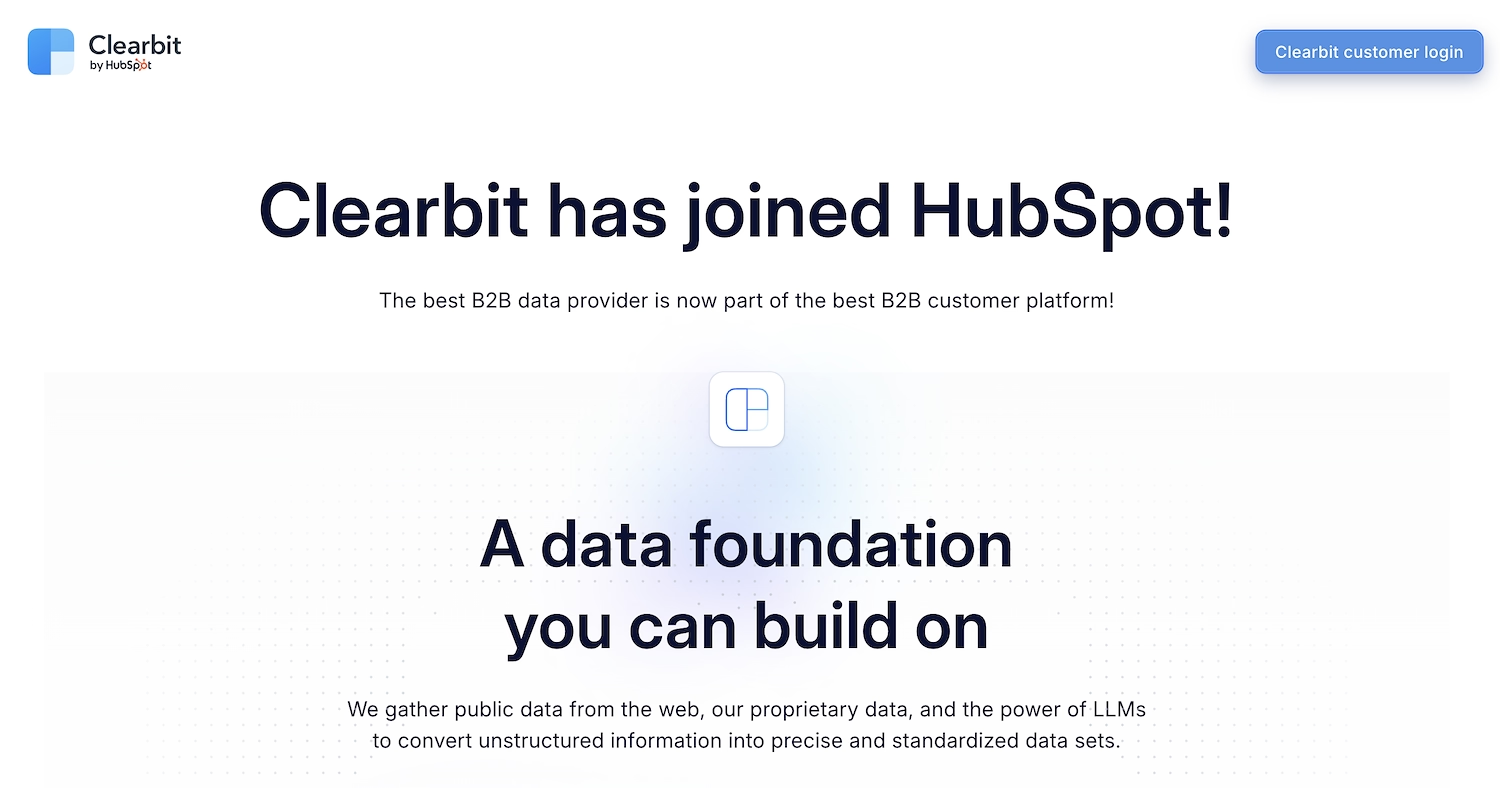
Clearbit is a data platform for B2B companies. It provides a database that teams use to enrich their records with details like company size and technology used. This helps sales departments and marketers to understand customers and find new prospects.
Clearbit's Main Features
- Appends over 100 data points to company and employee records for data enrichment.
- Detects companies visiting a website and syncs them directly to a CRM like HubSpot.
- Integrates with marketing automation platforms to optimize data workflows.
- Shortens website forms by hiding or autofilling known fields to increase conversions.
Clearbit vs. LeadFuze: A Comparison
Average Review score: 4.4/5 stars based on 626 G2 reviews.
- Clearbit enriches existing company and contact records with over 100 data points. This is different from LeadFuze, which focuses on building new prospect lists for users to export.
- It identifies anonymous companies that visit your website and syncs them to your CRM. This provides a source of warm leads, unlike LeadFuze, which generates lists from its external database.
- The platform can shorten website forms by autofilling fields for known visitors to help increase conversions. This is a marketing automation feature not found in LeadFuze's list-building tool.
- This tool offers deep integration with marketing automation platforms to enrich data in real time. This is a more dynamic process compared to LeadFuze, which centers on exporting static lists.
Where Clearbit Falls Short Compared to LeadFuze
- Clearbit lacks an automated list-building function for finding new prospects. In contrast, LeadFuze automatically adds new leads that fit a user's search criteria, which can save time on manual prospecting efforts.
- The tool offers fewer advanced filters for building new prospect lists from scratch. Compared to LeadFuze, which allows for complex search criteria, this might make it harder to create highly targeted lists for specific outreach campaigns.
- Its primary focus is on data enrichment rather than outbound prospecting. Teams that need to build new lead lists from the ground up may find LeadFuze's dedicated list-building features more direct for their workflow.
Pricing and Budget Considerations
LeadFuze uses a contract-based model, while Clearbit's pricing is customized for enterprise needs and is generally perceived to be in a higher tier. For the most accurate and up-to-date pricing information, we recommend visiting Clearbit's official website.
Which One Should You Go With?
Choosing a LeadFuze alternative depends on many factors, including your team's budget, workflow, and specific data needs. This guide reviewed several options to help you compare features and make an informed decision for your business.
If you want to automate sales functions, 11x provides digital workers to manage prospecting and lead qualification. This approach can replace separate tools for data and outreach, consolidating your sales process into a single platform.




